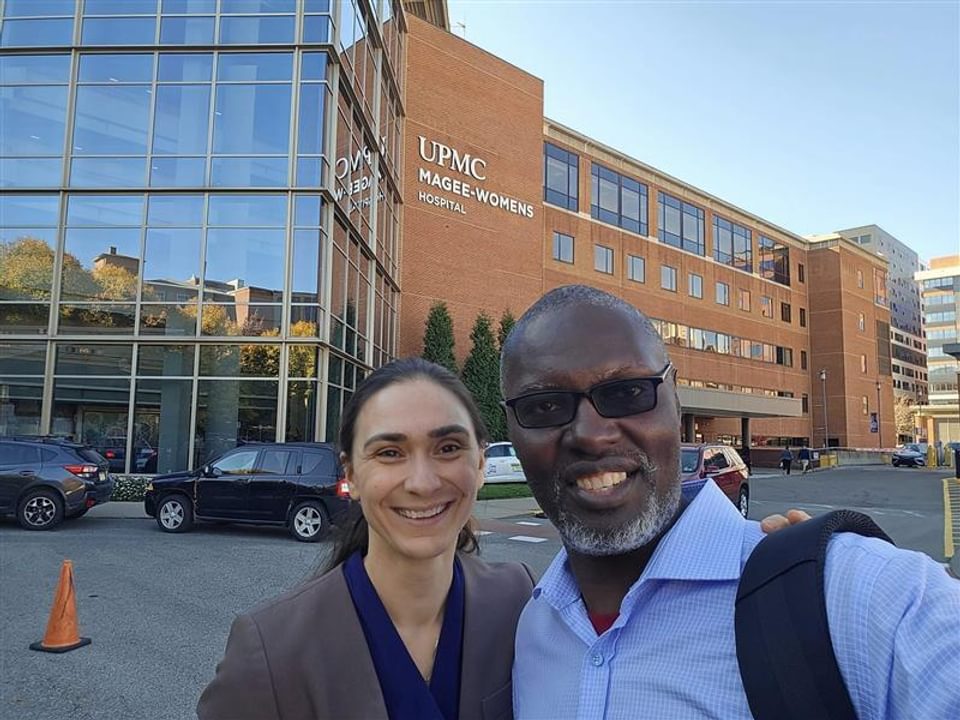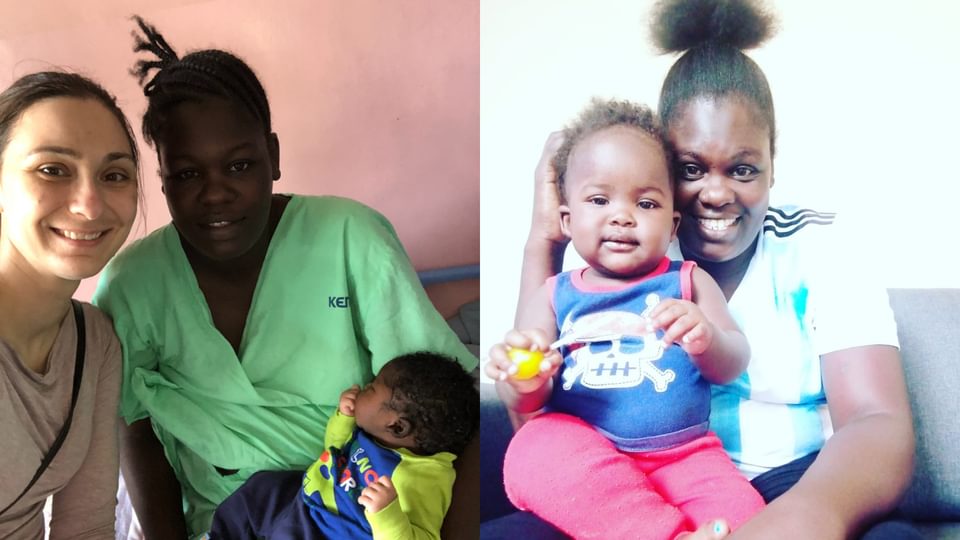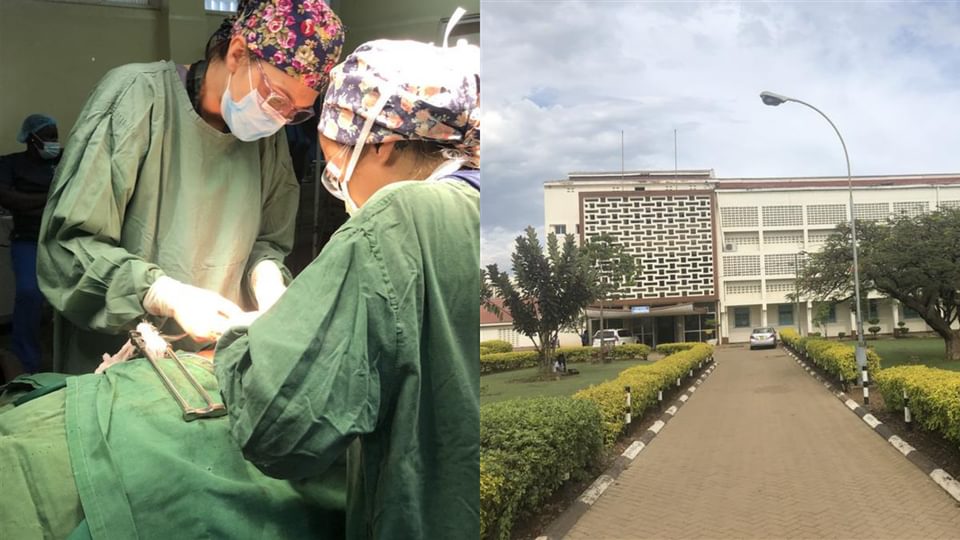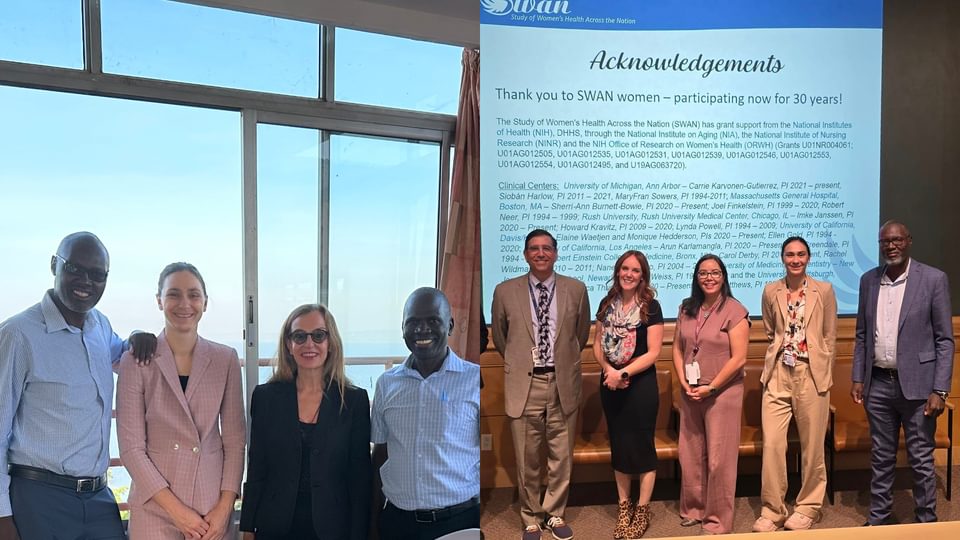Jambo, Kenya: International Partnership Offers UPMC Magee Residents Global Health Training That Enhances Care Close to Home

By: Gina Edwards
Flashback: it’s early March of 2020 at a public hospital in Kisumu City, Kenya.
Dr. Nina Ragunanthan, a resident at UPMC Magee-Womens Hospital, is assisting an attending Kenyan physician with a gynecologic surgery case when she gets a call for support from the other operating room.
She arrives to find a patient with an accreta –– a life-threatening condition where the placenta becomes embedded in and attached to the uterus, causing hemorrhaging.
Dr. Ragunanthan follows the lead of Dr. Jennifer Makin, Ob/Gyn, Global Health Specialist, and Expert Colposcopist. Together they perform an emergency cesarean hysterectomy –– a time-critical procedure with risks heightened by the local blood shortage, scant ICU beds, and limited resources.
“It was terrifying, but it was a great clinical experience to assist Dr. Makin on that surgery,” Dr. Ragunanthan says. “We were able to save this woman's life and then afterwards she named her baby ‘Jennifer’ after Dr. Makin.”
Occurring in less than 0.2% of all pregnancies, placenta accreta is rare –– and so are cesarean hysterectomies. But as the first resident to participate in this international clinical immersion program, Dr. Ragunanthan gained experience in addressing both.
Under the leadership of program directors Dr. Makin and Kenyan gynecologist-oncologist Dr. Gregory Ganda, UPMC Magee residents spend four weeks in rotation at Jaramogi Oginga Odinga Teaching & Referral Hospital. This donor-funded elective offered to residents at UPMC Magee provides important clinical exposure to and experience in obstetric and gynecologic conditions that are uncommonly seen and infrequently treated in the U.S., like late ectopic pregnancies, cryptococcal meningitis in pregnancy, abdominal tuberculosis, and fibroids, among others.
“Engaging in international medical work compels clinicians to refine their decision-making skills by relying on intuition, clinical knowledge, and physical examination due to limited diagnostic resources. This environment enhances adaptability and problem-solving abilities, fostering greater confidence in patient assessments,” Dr. Makin says.
Since the program launched in 2020, 11 residents and 6 attending physicians from UPMC Magee have participated, with plans to expand the model in coming years.

How It Started
In 2017, Dr. Makin participated in a fellowship program with Massachusetts General Hospital in Kenya, a country whose population faces staggering rates of malaria and HIV, resulting in a severe lack of available blood for transfusion, among other resource challenges.
She worked to support underserved communities during a yearlong strike of doctors and nurses. While all public hospitals were closed, she helped her team develop protocols and strategies to deal with obstetric emergencies and identified many women with microinvasive cervical cancer.
During her time in Kenya, Dr. Makin connected with Dr. Ganda at Jaramogi, with whom she worked and trained closely to operate and learn best surgical practices. Dr. Ganda recognizes the importance of international exchange programs, having previously participated in one of the first gynecology training programs in East Africa led by University of Toronto lecturers.
“Such exchanges are very important because they build people into global citizens,” Dr. Ganda says. “You get to learn new things, like doing surgery in remote areas where you don't have enough equipment.”
Together, Dr. Makin and Dr. Ganda formulated a proposal to form a residency elective offering this critical global health experience to others.
“Exposure to diverse health care systems and cultural perspectives necessitates adjusting clinical interventions to align with local norms and patient preferences, leading to a permanent transformation in practice and adeptness at cultural competency,” Dr. Makin says. “I wanted other residents to have experiences like mine because it was so impactful, meaningful, and life changing for me.”
She approached different U.S. universities with the proposal. Eventually, she connected with Dr. Bob Edwards at UPMC Magee, who found the program’s objectives to expose residents to different health care systems, collaborate with different universities, and share cross-cultural education were compatible with the Department’s mission.
Building on Dr. Makin’s international experiences, they designed the 4-week program for Magee residents to gain international experience in both inpatient and outpatient care, as well as gynecologic surgery while receiving comprehensive supervision and guidance from UPMC attending faculty. The program aimed to foster a bilateral learning exchange with Kenyan medical students, interns, medical officers, residents, and obstetricians and gynecologists.
How it’s Going
Now in its 6th year, the Kenya program has offered a variety of experiences and lessons to those who attend. Every participant’s experience looks a little bit different –– with Dr. Ragunanthan’s trip being cut short due to global pandemic restrictions. But she says that even the two weeks she spent there felt “jam-packed.”
“There were a lot of people who came in with complications from miscarriage or heavy bleeding anemia, needing blood transfusion or a D&C,” Dr. Ragunanthan says. “We also rounded in the wards, and managed different gynecologic complications, including cervical cancer, and ovarian cancer.”
Since cervical cancer is typically caught later in Kenya, and colposcopy procedures are not readily available, detection of this disease was a bigger part of Dr. Ragunanthan’s experience.
“Dr. Makin taught me visual inspection with acetic acid, which is a screening tool without the use of colposcopy, and we performed several loop electrical excision procedures (LEEPs),” she says. “There are certain times they’ll have patients needing that procedure back-to-back, like every 15 minutes.”

For other program participants like Dr. Rachel Dang, who participated in the elective during her third year of residency, her rotation at Jaramogi made her realize that resources like imaging and labs are taken for granted in the United States.
“The students in Kenya were taught to rely very heavily on their exam. I remember the consultant telling the students that based on looking at a patient's fingers, tongue, and eyes they should be able to estimate their hemoglobin level,” she says, adding that the experience has given her skills for her current role at a public hospital in New York:
“The lessons I took away from my rotation at Jaramogi were particularly helpful in working with culturally diverse communities with varied engagement in health care as well as working in an under-resourced environment. I learned so much about staying adaptable and working with the resources you have.”
Attending physicians also serve an important role on the team, both in guiding Magee residents and learning as providers themselves. Dr. Amaris Yandel, an ob-gyn who participated in the program during 2022 and 2023, said that the built-in knowledge exchange of the program makes it particularly impactful.
“There is an exchange of skills and information that continues even after we all go home,” Dr. Yandel says. “I really enjoyed teaching LEEPs to the registrars and am glad that that is something that is continuing to grow even when we are not there.”
Echoing this sentiment, Dr. Ragunanthan adds that the program is mutually beneficial –– not just a good opportunity for Magee trainees to gain surgical and clinical experience: “Dr. Makin is ensuring that this program is something that's sustainable, in partnership with the Kenyan doctors and under their supervision. It’s not just a drop-in program – it’s collaborative.”

What's in Store
In Fall of 2024, Dr. Ganda traveled to UPMC Magee for their annual Alumni Day. There, he and Dr. Makin shared presentations with alumni about the program and the importance of reciprocity with international partnerships.
“It must be mutually beneficial for there to be long-term sustainability. When both of us are benefiting, eventually the patient does, too,” he says. “When the Magee fellows come here, they get a lot of knowledge in surgical skills that will benefit a patient in the U.S.”
“Emphasizing ethical practices and mutual benefits, the program was meticulously organized and is continually evaluated to uphold these principles,” Dr. Makin says. “This structured approach ensures that participants receive a well-rounded, ethically sound, and culturally sensitive educational experience.”
For residents like Dr. Ragunanthan, now a practicing ob-gyn in Mississippi who often operates alone, the experience in Kenya proved to be an important precursor to a career working toward health equity: “Even on that short rotation, dealing with both the satisfaction and frustrations of working in an under resourced area certainly helped me with my career progress.”
Other participants like Dr. Yandel say that the experience reconnected them to their purpose as provider. “I honestly loved working in Kenya. Though the work was at times grueling, it reminded me of why I became a physician,” she says. “So often here we get caught up in paperwork and logistics and pressure to be ‘productive,’ whereas there it really felt like the patients were the center, which is what we all imagine when we get into medicine in the first place.
To Dr. Ganda, this “partnership around friendship” upholds a commitment to a key value in medicine: equity.
Together, they aspire to continue building out the program, eventually making it a bidirectional exchange where Kenyan trainees could also come to Pittsburgh and train at UPMC Magee.
“Partnerships start with people; they're never about documents,” says Dr. Ganda. “Jennifer and I have become friends who work together –– she's operated with me and learned a lot of complex surgery techniques from me, and I've learned techniques from her. When building the partnership, it starts around us, but then we exit because now the friendship becomes bigger.”
The Global Health Program in Kenya is made possible through donor support. To learn more about the program in Kenya, or to make a gift toward the future of the program, click here.
Read the full Spring 2025 issue of Magee Matters here.
Be the First to Know
Get the latest research, news, events, and more delivered to your inbox.